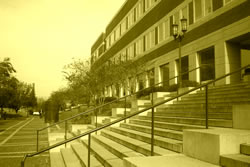|
April 18th: Jameson
Postmodernism, or, The Cultural Logic of Late Capitalism
Leading Class Discussion
Should we talk a little about the presents you'll be giving me next week, or should we just get righ to Jameson? Either way, I'd like us to have our discussion of Jameson be on defining Postmodernism and then getting to what I told you about last week--(re)instrumentalizing yourself to be happy within the condition that is...Postmodernism.
Jameson's Postmodernism, or , The Cultural Logic of Late Capitalism
I have a feeling this reading was much easier to read than previous authors. Some of his references might be obscure to us, but he's writing fairly clearly. That's a plus, right?
As usual, we have to find a way into the reading, one of several possible ways in. I like to think of Jameson in context of the rise of postmodern(ist) scholarship and, of course, his analysis of artchitecture. Before we get into those, though, we ought to consider Jameson's caution about theorizing Postmodernism itself. He warns that it difficult:
- "Postmodernism theory seems indeed to be a ceaseless process of internal rollover in which the position of the observer is turned inside out and the tabulation recontinued on some larger scale" (p. 64).
- when defining ideology's function...
"the production of functioning and living ideologies, is distinct in different historical situations...[and] there may be historical situations in which it is not possible at all--and this would seem to be our situation in the current crisis" (p. 53).
Culture Wars
Although Jameson isn't as well known in popular circles, he does sort of figure into the "Culture Wars" of the 1990s. Postmodern theory and theorizing gave rise to new kinds of scholarship that critiqued the hegemonic ideology of American society (and Western). Also, it (usually) embraced be the Left, and, therefore, anathema to the Right. However, the postmodern condition isn't a movement that you can be on or off--you're situated in it.
Postmodern theory is beneficial for all kinds of study inside the academy, but here's my reasons for English Studies:
- Literature: Jameson brings up interpretations of literature in his chapter, but Postmodernism is crucial for serious literature students. Unless I missed something in the last few years, Postmodernism is the dominant analytical framework for literature over the last 20 years.
- Rhetoric/Composition: Because we think about student identitity is a culmination of ones experiences (even if some of us think they're totally socially constructed), PoMo theory allows us to consider the multiple positions from which people argue, write, consider, and participate in democracy.
- Technical Communication: Well, as a member of a postindustrial, global economy, you need to understand how hierarchies lend themselves to technological production and, in turn, how humans interact with technology. Without that insight, you could edit a document, but you can't re-vision one.
Architecture
This is a great subject for us. I have a video for us and some Vegas pictures. Maybe we ought to back up a second to Eco's discussion of hyperreality.
- The museum guard and tourists (pp. 32-33)
- Section 5 on architecture (pp. 38-45)
Next Week's Readings
Richards for next week. There won't be a moodle post. If you're interested, here's a link to an article about Spokeo.com (the video is gone).
.. |
